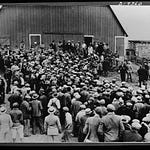
Last week, David Leonhardt, writing for the New York Times, questioned whether any of President Biden’s legacy would endure. Most Americans view his term unfavorably. Parties with one-term presidents often see those presidencies as failures and shift their focus to the future. However, Leonhardt highlighted one aspect of Biden’s agenda that may leave a lasting mark. This is the idea that “the federal government should take a more active role in both assisting and regulating the private sector than it did for much of the previous half-century.”
President Biden is not alone in his assessment. Both parties agree to some extent that unfettered free market globalization is not in America’s best interest. Similar to an approach used in the Gilded Age, President Trump intends to influence the global economic system through tariffs.
In his farewell address from the Oval Office, President Biden said, “Today, an oligarchy is taking shape in America of extreme wealth, power, and influence that literally threatens our entire democracy…We’ve seen it before, more than a century ago, but the American people stood up to the robber barons back then.”
Biden’s use of the term ‘robber barons’ is a reference to a phrase from the late 19th century, when Mark Twain’s The Gilded Age gave that period its name. From the 1870s to the early 1900s, the Gilded Age saw rapid industrialization, economic growth, glaring inequality, and societal transformation. It was also a time of innovation. From the birth of America to 1870, the US Patent Office granted 40,000 patents. By 1900, that number exploded tenfold. The country’s population nearly doubled in those 30 years from immigrants flooding into the nation to work in the factories. During this era, industrial magnates like Rockefeller, Carnegie, Vanderbilt, and Stanford amassed immense wealth. Twain satirized their greed and the corruption that defined America’s elite.
As the country experiences rapid digital transformation and robust economic growth, parallels to the Gilded Age are hard to ignore. Unlike then, wealth is concentrated in corporations rather than individuals and families. Like in the Gilded Age, many American families are left behind. Inefficient social programs that did not exist in the Gilded Age prop up society, but these programs come at the cost of unprecedented national debt. Without them, unrest would mirror the turmoil of the Gilded Age.
Leonhardt observed that the emerging idea of a more active federal role in regulating the private sector still lacks a name. Scholars and policymakers have referred to it as the “end of the neoliberal order,” “a new economics,” or “a new centrism.”
He makes a strong point. America has faced at least two significant periods of inequality before. In both instances, unifying messages helped Americans rise to the challenge. But before considering names, it’s worth breaking this idea into two fundamental questions.
First, do Americans have a mandate to address inequality?
Second, if Americans have a mandate and decide to act, what simple message could unite the nation and drive change?
Let’s start by considering the first question. Should Americans choose to address inequality?
Should America Address Inequality?
Businesses have no responsibility to address social inequality. None. Businesses have responsibilities only to their business and their shareholders. Diverting effort away from generating profit is using someone else’s money—shareholders, employees, or customers—for purposes they did not agree to. A business’s primary responsibility is to increase profits, and corporate executives should focus solely on maximizing shareholder value within legal and ethical boundaries. Any effort toward social justice is outside a business’s fundamental responsibility unless it directly contributes to profitability. While some businesses voluntarily pursue social initiatives, their fundamental legal responsibility is to maximize shareholder value.
Therefore, arguments claiming that businesses should pay higher wages to address social inequality are flawed, as businesses have no inherent responsibility to resolve societal issues. Declaring that an individual or group ‘should’ do something for which they have no responsibility (and therefore, no requirement) means they will do exactly what they are required to do. In this case, exactly nothing.
So…if businesses are not responsible for paying livable wages and can find workers willing to accept poverty-level pay, they have little incentive to raise wages voluntarily.
To continue this argument, we need to note that Americans can earn money from two sources: their work, or their fellow taxpayers in the form of the government. Because Americans get money from both sources, this leaves the government to address the shortfall in wages.
Through social programs, Congress spends the American people’s money to support society as a result of low wages. These social programs, subsidies, and incentives are supported by taxes collected from the American people. And our elected representatives certainly have the requirement to spend taxpayer money responsibly.
The basis of this requirement is found in Constitutional provisions that include the Spending Clause (Article I, Section 8), which directs Congress to allocate funds for defense and general welfare. It is further found in the Appropriations Clause (Article I, Section 9, Clause 7), which mandates transparency and accountability in public expenditures. Additionally, federal laws like the Antideficiency Act prohibit spending beyond appropriations, underscoring the Congressional duty to ensure fiscal discipline.
There’s another fascinating wrinkle here.
In United States v. Butler (1936), the Supreme Court ruled that Congress has the authority to spend money for the “general welfare” under the Spending Clause but that the Constitution limits that authority. This spending must serve the common good, not specific groups or industries. Subsidizing low wages with public funds serves business interests but not the American people as a whole.
Spending on social programs to help those who aren’t able to work supports American society by promoting order and tranquility. But half of American working families needing social program support is wildly excessive and points to low wages as a root cause problem.
The burden of wages has shifted from employers to taxpayers, violating the principle that public spending should benefit the nation as a whole.
We, the People, must meet the Constitutional standard to promote the general welfare. Therefore, Congress must act to reduce reliance on social programs by addressing systemic wage issues. Failure to do so violates Constitutional principles and harms the American public.
…
In short, we can answer our first question.
Do Americans have a mandate to address inequality?
Yes, Americans and our elected representatives have a Constitutional and legal mandate to address inequality. Failure to minimize spending on taxpayer-funded social programs benefits only special business interests, not the American people as a whole. This violates the Constitution. Therefore, we are mandated to take an active federal role in regulating the private sector.
Now, let’s recall our second question.
If Americans have a mandate and decide to act, what simple message could unite the nation and drive change?
History shows that when America faced inequality in the past, it found its way through unity and purpose. To understand how this was achieved, let’s turn to our nation’s first period of radical inequality and the leadership of Abraham Lincoln.
Lincoln’s Legacy
Abraham Lincoln led the nation through its first great reckoning with radical inequality. The divide between free labor in the North and enslaved labor in the South symbolized a moral and economic conflict.
This divide was too great for Lincoln to tolerate. As a lawyer, he was known for clear reasoning and ability to simplify complex issues. In an 1862 draft titled Meditation on the Divine Will, he wrote that “God can not be for and against the same thing at the same time.” Lincoln sought to preserve the union, the first national goal outlined in our Constitution. The union could not sustain itself half-slave and half-free; it had to be one or the other.
This question defined Lincoln’s leadership. In a nation of free men and enslaved men, who had the right to the fruits of their labor?
In his Fragments of a Tariff Discussion (1847), Lincoln articulated his economic philosophy. He referenced the biblical phrase, “In the sweat of thy face shalt thou eat bread,” to emphasize the dignity of labor and the moral imperative that workers should benefit from their toil. Later in his 1861 Annual Message to Congress, he outlined more specifically that “Labor is prior to and independent of capital. Capital is only the fruit of labor, and could never have existed if labor had not first existed. Labor is the superior of capital, and deserves much the higher consideration.”
Further, in Fragments, Lincoln wrote that a “most worthy object of any good government” is to ensure that “each laborer (receives) the whole product of his labor, or as nearly as possible.” This belief tied directly to his fight against slavery as both a moral and economic injustice that denied millions of people their rightful share of the wealth they created.
Critics often downplay Lincoln’s connection to labor rights. They argue that he focused narrowly on preserving the Union or that the Civil War was not fundamentally about slavery. Luckily, Lincoln was a prolific writer who preserved his thoughts in ink. His views on labor were intertwined with his opposition to slavery. He believed that the right to benefit from one’s work was essential to a just and prosperous society.
Lincoln’s leadership was guided by principles that resonate as mantras even today.
“A house divided against itself cannot stand” captured his conviction that the nation’s survival depended on resolving the division between free and enslaved labor.
The Gettysburg Address’s “Government of the people, by the people, for the people” reaffirmed his belief in the republic’s role to enable the opportunity of Americans of any station of birth to benefit from their work.
As we confront modern inequality, we consider Lincoln’s legacy. He faced an economic system that denied millions of workers their fundamental rights. His vision of fairness in labor was twofold: First, each person has the right to benefit from their work, and second, ‘We, the People,’ must protect that right. These principles remain as vital today as they did during the Civil War.
The second national period of severe inequality was the Gilded Age. Several individuals led the nation through this more prolonged period, but Teddy Roosevelt left a decisive impact.
Teddy Roosevelt’s Legacy
President Theodore Roosevelt’s legacy is that for any one of us to be great, we all need to be able to be great. The primary source of our welfare is our work. The welfare of each of us depends on the welfare of all of us.
Teddy Roosevelt stepped forward during the Gilded Age to confront the entrenched power of industrial elites and champion the ability of individual Americans to be great. By Roosevelt’s time, the wealth and influence of “robber barons” like Rockefeller and Carnegie had reached unprecedented heights. They left millions of workers behind for a system that favored the few over the many. Roosevelt saw this disparity as a barrier to the greatness of the American people.
Roosevelt’s presidency is best remembered for his bold actions against corporate monopolies. As the “trust-buster,” he challenged the power of industrial giants, using the Sherman Anti-Trust Act to dismantle monopolies like Northern Securities and to regulate companies like Standard Oil. His actions conveyed that no individual or corporation was above the law. Roosevelt understood that unchecked corporate power created inequality and stifled opportunity, making it impossible for the average person to succeed and thrive.
Roosevelt didn’t believe that the government’s role was to tear down booming businesses or level the playing field. He believed that the government should give every individual a “Square Deal,” or fair chance, to be great. A core premise of his administration was that the government needed to actively intervene on behalf of the general public to ensure economic opportunity for all.
Roosevelt’s mantras reflect these principles.
“Far and away, the best prize that life offers is the chance to work hard at work worth doing,” reflected his belief that fulfillment, purpose, and personal greatness are achieved through dedication to meaningful effort.
“The welfare of each of us depends on the welfare of all of us” embodied Roosevelt’s vision of a society where every individual, regardless of birth or background, had a fair chance to succeed. In this society, the government had a duty to protect the rights of workers, promote fair competition, and ensure access to opportunity.
Roosevelt’s legacy reminds us of the importance of empowering individuals to be great. Greatness is a product of good work and a fair share of the profits from that work. Greatness is a collective pursuit. His presidency was a testament to the idea that everyone deserves a square deal to live, work, and achieve.
…
Now we can address our second question.
If Americans have a mandate and decide to act, what simple message could unite the nation and drive change?
A New Economics: Reward Work, Build Opportunity
Lincoln faced a nation divided by slavery and inequality, but he never wavered in his belief that every worker deserved the fruits of their labor. Roosevelt fought against monopolies to ensure that individual Americans had a fair chance to succeed.
Both great leaders focused their decisive effort on enabling Americans from any station of birth to reap the value of their work.
They had two simple messages.
First, the messages “A house divided against itself cannot stand” and “Far and away, the best prize that life offers is the chance to work hard at work worth doing” share a common theme. The survival of the nation relies on Americans finding fulfillment and purpose through meaningful work and having the right to bring the fruits of their labor home to their families.
Second, the messages “Government of the people, by the people, for the people” and “The welfare of each of us depends on the welfare of all of us” emphasize the government’s duty to safeguard that right and ensure opportunity for all Americans, regardless of their station of birth.
These simple messages illuminate the fundamental human truth that fulfillment comes from enjoying our work and eating and drinking with those we love.
With these truths in mind, we can answer our second question.
If Americans have a mandate and decide to act, what simple message could unite the nation and drive change?
“A New Economics: Reward Work, Build Opportunity” is a good starting point.
May God bless the United States of America.












